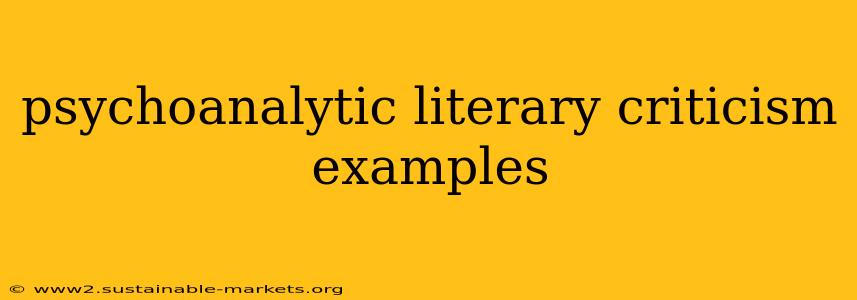Psychoanalytic literary criticism delves into the depths of human psyche, using the theories of Sigmund Freud and his followers to interpret literary texts. It explores how unconscious desires, conflicts, and defense mechanisms manifest in characters, narratives, and symbolism. This approach goes beyond surface-level meaning, uncovering hidden motivations and psychological complexities that enrich our understanding of literature. Let's explore some examples demonstrating the power of this critical lens.
Key Psychoanalytic Concepts in Literary Criticism
Before diving into examples, it's crucial to understand some core psychoanalytic concepts frequently employed:
-
The Id, Ego, and Superego: Freud's structural model of the psyche. The id represents primal instincts, the ego mediates between the id and reality, and the superego embodies moral constraints. Analyzing how these forces play out in characters reveals internal conflicts and driving motivations.
-
Oedipus Complex: A boy's unconscious sexual desire for his mother and feelings of rivalry towards his father. This complex, and its female counterpart, the Electra complex, can be seen reflected in character relationships and power dynamics within narratives.
-
Defense Mechanisms: Unconscious strategies used to cope with anxiety, such as repression, denial, projection, and sublimation. Identifying these mechanisms helps understand characters' behaviors and their attempts to manage internal conflict.
-
Symbolism and Dreams: Psychoanalytic critics interpret symbols and dream sequences as manifestations of unconscious desires and anxieties. Analyzing these elements can unlock hidden meanings and deeper interpretations of the text.
Examples of Psychoanalytic Literary Criticism in Action
Let's examine how these concepts apply to specific literary works:
1. Hamlet by William Shakespeare:
A classic example of psychoanalytic interpretation. Hamlet's procrastination in avenging his father's murder can be analyzed through the lens of the Oedipus complex. His intense grief and ambivalent feelings towards his mother (Gertrude) and his uncle (Claudius) can be interpreted as manifestations of unresolved Oedipal conflicts. His hesitation might stem from unconscious guilt and anxieties related to these complex feelings. The play's numerous instances of repressed emotions and subconscious desires provide rich ground for psychoanalytic exploration.
2. Wuthering Heights by Emily Brontë:
Heathcliff's relentless pursuit of revenge and his destructive relationships can be understood through a psychoanalytic lens. His childhood trauma and the loss of Catherine can be seen as formative experiences shaping his psyche. His obsessive love and vengeful actions can be interpreted as manifestations of repressed desires and unresolved grief. The novel's gothic atmosphere and dramatic events further contribute to the psychoanalytic interpretation, emphasizing the power of the subconscious in shaping human behavior.
3. The Great Gatsby by F. Scott Fitzgerald:
Gatsby's relentless pursuit of Daisy can be analyzed through the lens of idealized love and the inability to let go of the past. His extravagant parties and attempts to recreate the past can be viewed as defense mechanisms against the pain of loss and unrequited love. The tragic ending underscores the destructive power of unresolved desires and the limitations of the ego in confronting reality. The novel's themes of wealth, ambition, and the American Dream provide a fertile ground for psychoanalytic interpretation.
4. One Hundred Years of Solitude by Gabriel García Márquez:
The cyclical nature of history and the recurring themes of love, loss, and family in this novel lend themselves to psychoanalytic interpretation. The Buendía family's struggles, their repeating patterns of behavior, and the surreal elements can be analyzed as manifestations of collective unconscious patterns and inherited psychological traits. The novel's exploration of memory, trauma, and the family dynamic provides ample material for this critical approach.
Conclusion: The Enduring Power of Psychoanalytic Criticism
Psychoanalytic literary criticism provides a powerful tool for understanding the complexities of human nature as reflected in literature. By exploring the unconscious motivations, conflicts, and defenses of characters, we gain a deeper appreciation of the narrative, themes, and symbolic language within the text. This approach allows for rich and nuanced interpretations that go beyond the literal, offering profound insights into the human condition. While not without its limitations and criticisms, psychoanalytic literary criticism remains a vital and enduring method for engaging with literature.

